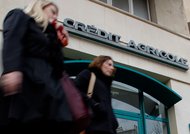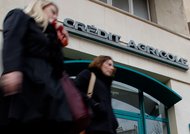Just a day after the Federal Reserve hinted that it could soon begin winding down its bond-purchasing program, investors were unnerved by reports that Chinese banks had become reluctant to lend to one another, causing interest rates in the interbank market to spike to punishingly high levels.
On Wall Street, the broad-based Standard Poor’s 500-stock index ended down 2.5 percent Thursday, the Dow Jones industrial average dropped 2.3 percent — more than 350 points — and the Nasdaq composite index shed 2.3 percent. On Wednesday, the S.P. 500 fell 1.4 percent.
The pain was also felt in the bond market, with yields on government bonds, which move in the opposite direction of the price, surging worldwide. The 10-year United States Treasury bond was yielding 2.380 percent, up 2.8 basis points. A basis point is one-hundredth of a percent. Expectations that interest rates will rise tend to depress the prices of existing securities.
A purchasing managers’ report added to fears that China, which has been an engine of growth in the world economy, might not be able to carry the load indefinitely. The report suggested Chinese manufacturing was contracting.
“There’s been a lot of focus on the market rates in China,” said Laurent Fransolet, a European rate strategist at Barclays in London. “Whether it’s a full-fledged credit crunch remains to be seen.”
Analysts at Nomura International noted that one rate, known as the seven-day repo rate, rose to as high as 25 percent on Thursday, compared with just 4 percent a month ago, as the Chinese central bank declined to smooth the market.
“But the main driver here has been the aftermath of the Fed,” Mr. Fransolet said about the global stock activity. “We’re still seeing the ripples of that.”
In Europe, the benchmark Euro Stoxx 50 index fell 3.1 percent, while the FTSE 100 in London ended down 3 percent.
In Asian trading, the Shanghai Stock Exchange composite index fell 2.8 percent. The Nikkei 225 stock average in Tokyo dropped 1.7 percent, the Hong Kong benchmark Hang Seng Index declined 2.9 percent and the SP/ASX 200 index in Sydney fell 2.1 percent.
Gold futures dropped 6.2 percent, to $1,288.40 an ounce. The euro fell 0.6 percent, to $1.3220, while the dollar rose 1.6 percent, to 97.98 yen.
Markets had already been jittery after hearing about the Federal Reserve’s plans to end the special operations it has been using to add liquidity to shore up the financial system. On Wednesday, Ben S. Bernanke, the Federal Reserve chairman, said the Fed hoped to begin reducing the size of its monthly bond purchases by the end of 2013 and end the program as soon as the American jobless rate fell to 7 percent.
Mr. Fransolet said investors had become accustomed to the so-called quantitative easing policies used by central banks to provide liquidity and support asset prices. In recent years, he said, markets faltered when the authorities talked about ending those policies and the central bankers had then backtracked.
But this time, he said, investors have grasped that the Fed is much more confident.
“That’s something the markets need to take on board,” Mr. Fransolet said. “That’s a big change from the last few years.”
The sell-off Thursday came in the face of economic news that showed an improving trend, if not actual growth, in the European economy. Markit Economics said its purchasing managers’ composite output index for the euro zone rose to 48.9 in June from 47.7 in May, bringing the index to its highest level in 15 months. While an index level below 50 suggests economic contraction, the fact that the index has been ticking upward for three straight months indicated Europe may be on the way out of recession.
Chris Williamson, Markit’s chief economist, said the data signaled “stabilization in the third quarter and growth appearing in the fourth.”
London stocks fell as the Bank of England said British banks needed to raise their capital by another 13.4 billion pounds, or $20.7 billion, this year to improve their finances. The Bank of England made the announcement on the same day that euro zone finance ministers convened in Luxembourg, where banking issues were to be at the top of the agenda.

Article source: http://www.nytimes.com/2013/06/21/business/global/daily-stock-market-activity.html?partner=rss&emc=rss




